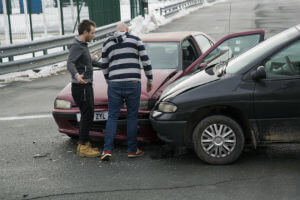 If you are involved in an accident while visiting Indiana from another state or even just driving through, you may be unsure how to recover the damages you sustained.
If you are involved in an accident while visiting Indiana from another state or even just driving through, you may be unsure how to recover the damages you sustained.
The South Bend car accident lawyers at Pfeifer, Morgan & Stesiak are available to discuss your out-of-state driver’s rights under Indiana law and assist you with filing a claim for compensation. We offer a free initial car crash consultation to discuss your accident and potential legal options.
Dealing with the Insurance Companies
Figuring out how to proceed after a car accident is always a little daunting, but for out-of-state collisions, it can be especially confusing to know where to start. As with any car accident, the best first step is to call 9-1-1. Having a police officer come to the scene will create an official record of the crash and get medical help on the scene as soon as possible.
Jurisdiction For Your Insurance Claim
As an out-of-state motorist, you are subject to the state laws where your accident occurred. Since Indiana follows a fault-based insurance system, you will need to file your insurance claim against the at-fault driver’s insurance. Pursuing an insurance claim can be tedious when you are not a local resident, and the insurance company may count on this and try to get you to settle quickly to avoid the hassle. However, accepting the first settlement offer may not be in your best interests as it will likely be a lowball figure that will not cover all of the damages you sustained.
Hiring a local attorney can help simplify the insurance claim process for you. Our lawyers have extensive knowledge of Indiana state laws and are prepared to help you navigate the confusing legal process for an out-of-state insurance claim.
Indiana Insurance Requirements
All drivers in Indiana are legally required to maintain liability car insurance in the following minimum amounts:
- Per accident bodily injury limits of $25,000 per person and $50,000 per incident
- Property damage at $10,000 per a single accident
In an out-of-state accident, the claim will follow the minimums of the state where your collision occurred. If the at-fault driver is underinsured, some insurance companies may increase coverage limits to match the state minimums while others will not. However, if your damages exceed the driver’s insurance limits or if the driver was uninsured, you can file a claim under your uninsured or underinsured motorist (UM/UIM) coverage if you have it.
Medical Coverage
You may be able to use your own Personal Injury Protection (PIP) coverage or MedPay to cover your medical expenses until a settlement is reached. Your own health insurance can also help pay for related medical costs after a car crash. However, keep in mind that you may be charged more for out-of-network care. Additionally, you may have to reimburse some of the costs out of your settlement.
Pursuing a Personal Injury Case Against the At-Fault Party
If your accident occurs in Indiana, your claim must adhere to state laws. If your damages exceed the at-fault drivers limits, a personal injury case must also be filed in-state. A licensed lawyer in Indiana can protect your best interests, ensure your legal rights are protected throughout the life of your lawsuit, and handle any legal or insurance complications that may arise from your out-of-state accident.
Indiana’s Comparative Law
In cases where you may have contributed to the car accident, Indiana’s comparative law may apply. What this means is that your final settlement may be reduced by whatever portion of fault you are assigned in the collision. For example, if you are found 10 percent liable for the crash and your final settlement is $100,000, your award will be reduced by that 10 percent, or $10,000, to give you a total of $90,000.
Statute of Limitations
The deadline for filing a personal injury claim, or statute of limitations, will also be defined by the state in which your accident occurred. In Indiana, you typically have two years from the date the accident occurred to file a claim. Be aware that there are exceptions to these time frames, so it is a good idea to consult with an attorney to determine what deadline applies in your situation. If you miss this filing date, any attempt to pursue a personal injury claim will likely be dismissed by the court.
How Hiring A Lawyer Can Help
Our experienced lawyers have in-depth knowledge of Indiana state law and how to handle issues that may arise because you are an out-of-state motorist. Additionally, we are prepared to help you obtain local vehicle repairs and any medical assistance you need before traveling back to your home state.
At Pfeifer, Morgan & Stesiak, we are dedicated to helping our injured clients, and we are prepared to help you pursue the maximum compensation available for your potential claim.
Contact us today to schedule a free, no-obligation consultation: (844) 678-1800











